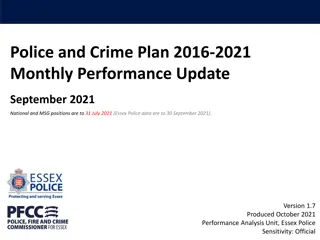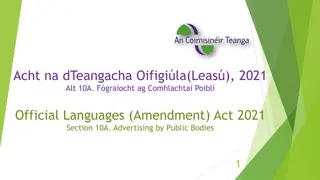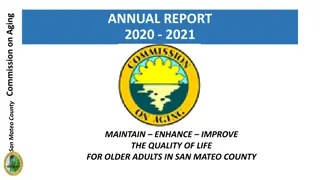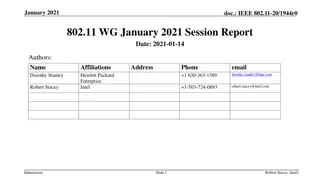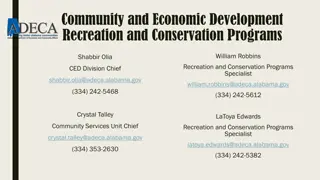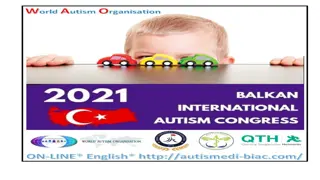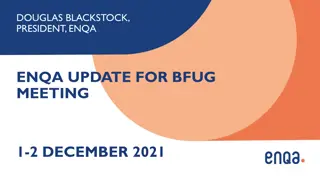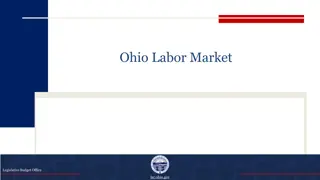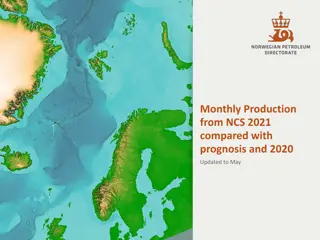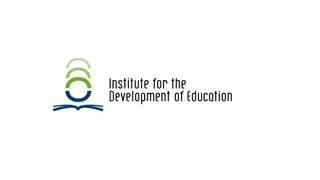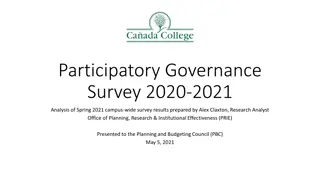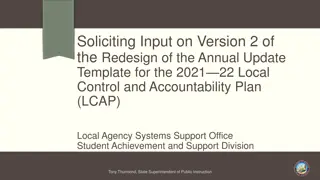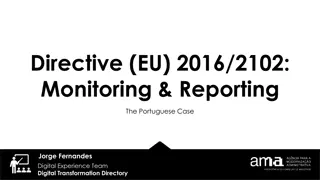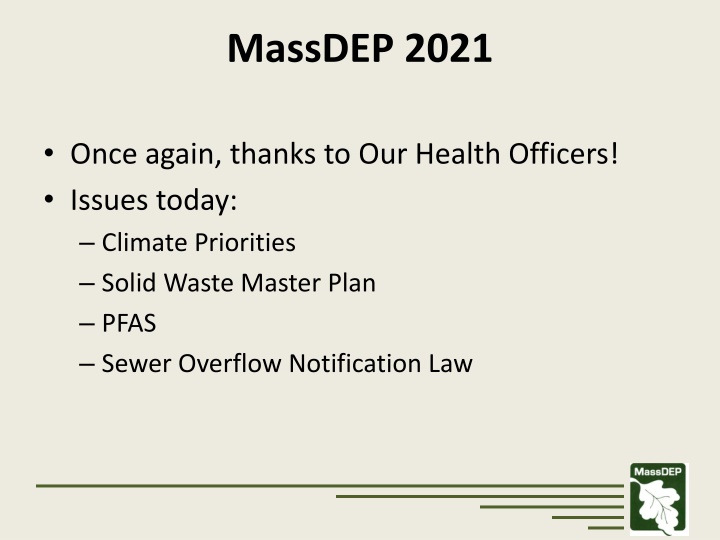
MassDEP Solid Waste Master Plan Highlights 2020-2030
"Explore the key initiatives outlined in the Massachusetts Department of Environmental Protection's Solid Waste Master Plan for 2020-2030, focusing on ambitious goals to reduce waste disposal, enhance recycling programs, and engage with Environmental Justice communities. Learn about strategies to address climate change, transportation resiliency, and wetlands preservation in alignment with statewide climate objectives. Discover the state's commitment to sustainability through innovative programs and partnerships. Stay informed on Massachusetts' efforts to manage solid waste effectively for a greener future."
Download Presentation

Please find below an Image/Link to download the presentation.
The content on the website is provided AS IS for your information and personal use only. It may not be sold, licensed, or shared on other websites without obtaining consent from the author. If you encounter any issues during the download, it is possible that the publisher has removed the file from their server.
You are allowed to download the files provided on this website for personal or commercial use, subject to the condition that they are used lawfully. All files are the property of their respective owners.
The content on the website is provided AS IS for your information and personal use only. It may not be sold, licensed, or shared on other websites without obtaining consent from the author.
E N D
Presentation Transcript
MassDEP 2021 Once again, thanks to Our Health Officers! Issues today: Climate Priorities Solid Waste Master Plan PFAS Sewer Overflow Notification Law
MassDEP 2021 MassDEP Work in 2021/COVID MassDEP: we are in business! Website: mass.gov\dep Transition to Hybrid workplace Continued Coordination with Water Suppliers, Wastewater Operators and Waste and Recycling Sector
MassDEP 2021 Climate Change Transportation Resiliency & Wetlands
2020-2030 Solid Waste Master Plan The 2020-2030 Solid Waste Master Plan: Issued 10/18 Establishes the Commonwealth s policy framework for reducing and managing solid waste. Proposes a broad vision and strategies for how the Commonwealth will manage our waste over the next decade and beyond. Is prepared in accordance with the requirements of Massachusetts General Law Chapter 16, Section 21.
SWMP Plan Highlights Sets aggressive disposal reduction goals for 2030 and 2050 supported by new strategies 2030 Disposal Reduction Goal of 1.7 million tons/year 2050 Disposal Reduction Goal of 5.1 million tons/year Aligns efforts with Commonwealth Climate Goals by efforts to address emissions Expands successful Food Waste Reduction Program Set more aggressive goals for further reduction of food waste by 500,000 tons annually Establishes New Bans for Mattresses and Textiles Implement new bans on mattresses and textiles, Bans supported by established and enhanced assistance, outreach and market development programs Increase inspections and enforcement of current bans
SWMP Plan Highlights Improves Programs and establishes ongoing engagement with Environmental Justice communities Updating grant program criteria to prioritize and increase grant awards to EJ communities Promote use of hybrid/electric trash and recycling trucks in EJ Communities Ongoing engagement to address community issues Dynamic and flexible plan, with built in opportunities to refine and update Continue to develop specific action plans for food waste, construction materials, reduction & reuse, and recycling markets and update these in consultation with stakeholders Develops strategic recycling markets action plan Establishes a state Recycling Market Development Council Support innovation in the area of recycling through work with leading academic institutions and enhanced grant opportunities of over $1 million this year (recycling markets and new technologies)
Next Steps Ongoing engagement to implement new bans Work on Recycling and Reuse Action Plan State Council
PFAS: A Unique Challenge Poly- and perfluoroalkyl Substances Family of thousands of compounds Extremely stable heat & stain resistant, water repellant Forever chemicals - persistent, do not biodegrade Water Soluble
SCIENTIFIC RESEARCH & HEALTH ADVISORIES Targeted monitoring of public water supplies MassDEP Priority PFAS Activities Testing wastewater, residuals, riverine waters, new water supply sources Cleanup standard regulations Drinking Water standard EXTENSIVE MONITORING
PFAS6 Drinking Water Standard Regulations establish a new Maximum Contaminant Level (MCL): highest level of a contaminant allowed in drinking water. MCLs are enforceable standards PFAS6 MCL is 20 ppt for the sum of six PFAS Based on MassDEP s Office of Research and Standards assessment of toxicology information. Reviewed and endorsed by MassDEP Health Effects Advisory Committee
Legislative Funding Allocation Public & Private Water Supply Testing New Resources to Address PFAS Grants for Design of Drinking Water Treatment Funding - 0% interest loans for treatment. $20 million in funding. Governor s ARPA Proposal.
PFAS6 Drinking Water Standard Public Water Suppliers Currently there are 1,618 active PWS in the State of which 1,467 are required to test for PFAS (have their own water source) 311 Community PWS have tested their water for PFAS. The remaining 137 small Community PWS are required to test this month. 811 PWS have signed up for free sampling Private well sampling Meetings are held with town and state officials in the 84 selected communities with > 60% residents served by private wells. Outreach is done via postcards and social media. 2,782 homeowners have applied for the free sampling from the 84 towns. 845 homeowners are now sampling/have sampled. This number includes all who have been sent sampling kits. We have results from 727 private wells; 94.8% are below the MCL. 3 private wells have tested with results above the 90 ppt imminent hazard
PFAS6 Drinking Water Standard Grants/Loans for PWS 15 PFAS construction projects and one planning project are being financed with 0% interest loans through the Clean Water Trust/MassDEP. $5 million in grants were awarded to 26 PWS for the planning and design of PFAS treatment systems. 19 applications from PWS for the Interim PFAS Response Grant Program are under review. $2 million in funding is available in multiple rounds. Round 2, will be announced later in the Fall. ARPA Funding Governor s Proposal would allocate funds to projects addressing PFAS
PFAS Federal Roadmap Announced 10/18 Participation in Legislative Task Force Ongoing work with Residuals NPDES Wastewater Testing Surface Water Testing
Sewer Overflow Notification Law New Statute signed into Law January 2021 Addresses Combined Sewer Overflow (CSO) issues in rivers establishes requirements and procedures for notifying the public of sewage discharges and overflows into the surface waters of the Commonwealth Dischargers will be required to notify the public of discharges of certain types of untreated or partially treated wastewater, including discharges that fall into the categories of CSOs, sanitary sewer overflows (SSOs), and blended wastewater. MassDEP must maintain statewide database and develop regulations by January, 2022; effective summer 2022.
Sewer Overflow Notification Law Requires notifications to be issued within two hours of the discovery of discharge, and specify which notices must go to specific local, state, and federal government agencies, news organizations, and any individual who has subscribed to receive such notifications. The regulation will also require municipal boards of health or health departments to issue public health warnings under certain circumstances. The proposed regulation, a summary of the regulation, and a Note to Reviewers are available on MassDEP s website: https://www.mass.gov/regulations/314- CMR-1600-notification-requirements-to-promote-public-awareness-of-sewage- pollution The public comment period began October 4, 2021 and ends on November 8, 2021.



